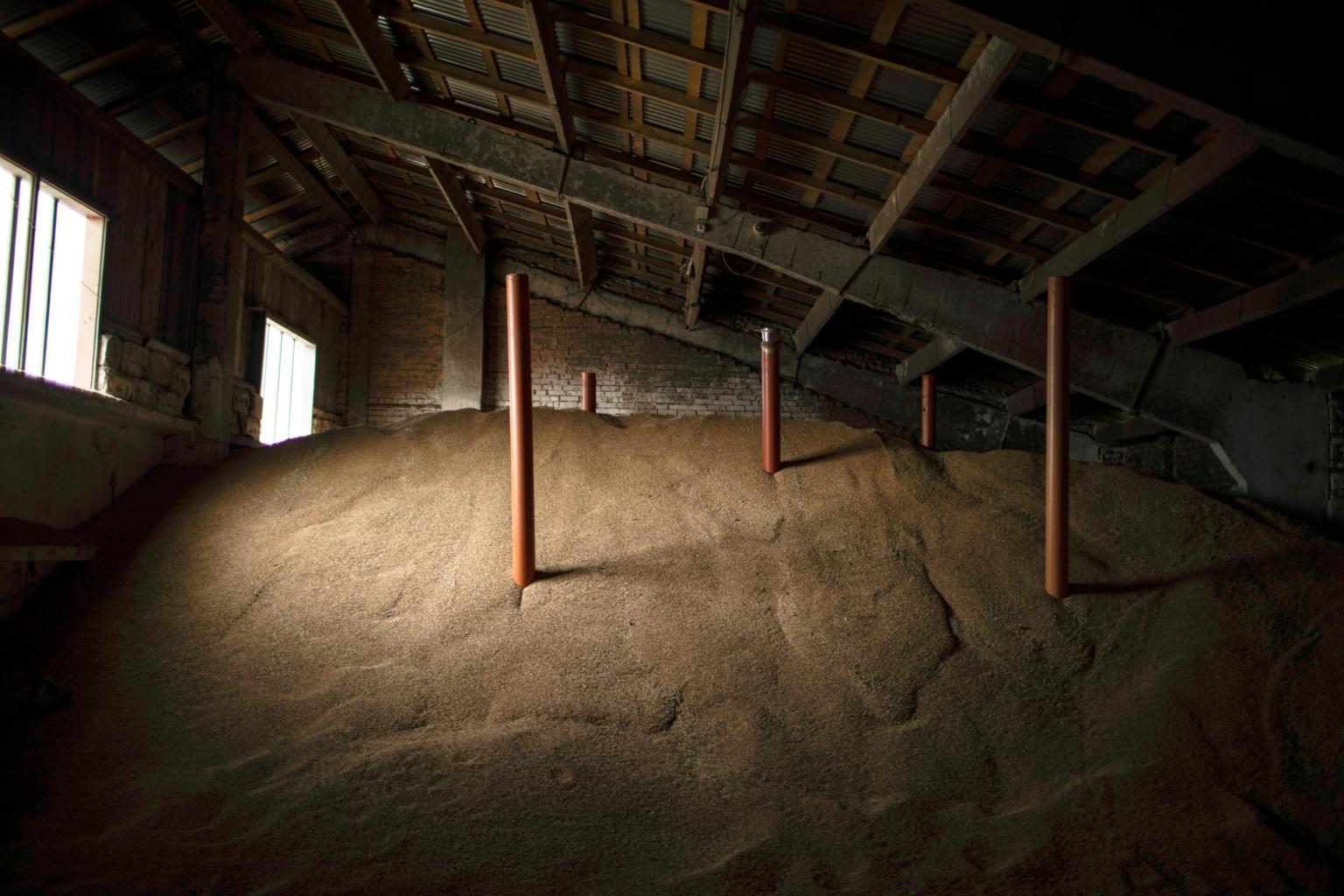War raises famine fears as Russia chokes off Ukraine's farms and exports
Sign up now: Get ST's newsletters delivered to your inbox

A grain warehouse on the outskirts of Lviv, Ukraine, on May 17, 2022.
PHOTO: NYTIMES
Follow topic:
DAVOS, SWITZERLAND (NYTIMES) - Fears of a global food crisis are swelling as Russian attacks on Ukraine's ability to produce and export grain have choked off one of the world's breadbaskets, fuelling charges that President Vladimir Putin is using food as a powerful new weapon in his three-month-old war.
World leaders called on Tuesday (May 24) for international action to deliver 20 million tonnes of grain now trapped in Ukraine, predicting that the alternative could be hunger in some countries and political unrest in others, in what could be the gravest global repercussion yet of Russia's assault on its neighbour.
At the World Economic Forum in Davos, Switzerland, where worries about the war's consequences have eclipsed almost every other issue, speakers reached for apocalyptic language to describe the threat.
"It's a perfect storm within a perfect storm," said Mr David Beasley, executive director of the World Food Programme, a United Nations agency. Calling the situation "absolutely critical", he warned: "We will have famines around the world."
The world's food distribution network was already strained by pandemic-related disruptions, and exports from Ukraine, ordinarily among the world's biggest suppliers, have plummeted because of the war. Russia has seized some of the country's Black Sea ports and blockaded the rest, trapping cargo vessels laden with corn, wheat, sunflower seeds, barley and oats.
Russian forces have taken control of some of Ukraine's most productive farmland, destroyed Ukrainian infrastructure that is vital to raising and shipping grain, and littered farm fields with explosives.
Dr Ursula von der Leyen, president of the European Union's executive branch, told the political and business leaders gathered in Davos that Russia - an even bigger exporter - had confiscated Ukrainian grain stocks and agricultural machinery.
"On top of this, Russia is now hoarding its own food exports as a form of blackmail, holding back supplies to increase global prices, or trading wheat in exchange for political support," she said.
The food crisis took centre stage at Davos, where President Andrzej Duda of Poland warned that famine in Africa and elsewhere would prompt a flood of migration to Europe, where searing memories are fresh of the 2015-2016 migration wave that strained EU unity and empowered xenophobic nationalist movements.
Ukraine and Russia ordinarily account for about one-quarter of the grain traded internationally; in recent years, Ukraine had exported an average of about 3.5 million tons of grain per month. In March, only 300,000 tonnes were shipped out, though exports rebounded somewhat to more than 1 million tonnes in April and could reach 1.5 million tonnes in May, said Mr Roman Slaston, the chief of Ukraine's agricultural industry group.
Ukraine's agriculture ministry says that the Black Sea blockade has prevented 14 million tonnes of corn, 7 million tonnes of wheat and 3 million tonnes of sunflower seeds from reaching world markets. Ukrainian officials have accused Moscow of stealing Ukraine's produce and then selling it abroad as Russian.
Western officials are circulating proposals for getting grain out of Ukraine, such as having multiple countries send warships to escort cargo ships from Ukrainian ports and run the blockade, but that runs the danger of a shooting confrontation with Russian vessels. Sending ships from Nato countries is considered particularly risky - like the rejected idea of having Nato members enforce a no-fly zone to keep Russian warplanes away from Ukraine - so much of the talk has been about countries outside the alliance taking part.
But Nato Secretary-General Jens Stoltenberg warned that breaking the Black Sea blockade would be very hard. "Is it possible to get it out on ships? That is a difficult task. It's not an easy way forward."
Ukraine has continued to ship grain overland through Europe, and work is underway to expand such routes, Dr von der Leyen and Mr Slaston said - but doing so on a scale great enough to replace seagoing shipment would be very difficult. The railways in Eastern Europe use different gauges, which means switching equipment when going long distances, and many of Ukraine's railroads, highways and bridges have been damaged by Russian attacks.
And perhaps most frightening are the countless mines left by retreating Russian forces, especially in the north. The Ukrainian Deminers Association, a group that locates and removes explosives, says nearly 45 per cent of the fields it has inspected in the Kyiv and Chernihiv regions were mined.
Mr Gordie Siebring, a farmer based near the Belarusian border, said Ukrainian military authorities warned him he could not sow the fields closest to the frontier because of the mine threat, meaning he has been unable to plant 8-10 per cent of his field. Neighbouring farmers have it much worse, he said, because Russian mines have made more than two-thirds of their fields too dangerous to use.
"If they are as close as 10 to 15km away, they can launch mines with artillery," he said. "These mines have small parachutes and land in the fields and have sensors that cause detonation later. Those are really causing havoc."
Before the war, droughts in North America and the Horn of Africa, poor harvests in China and France, and the pandemic were already squeezing food supplies, leaving the world uncommonly vulnerable. By December, global wheat prices had risen about 80 per cent in a little more than a year, according to the International Monetary Fund.
Even before Russian tanks rolled across Ukraine's border, experts were warning of "a massive surge in food insecurity and the threat of famine", said Professor Adam Tooze, director of the European Institute at Columbia University in New York.
The war, he said, is "impacting an incredibly fragile food system".

